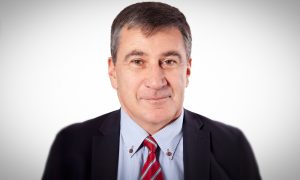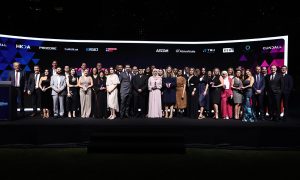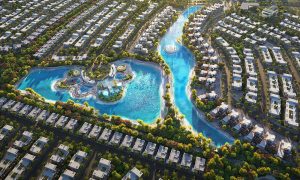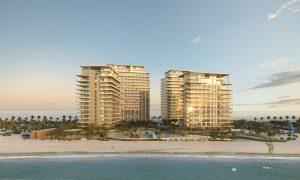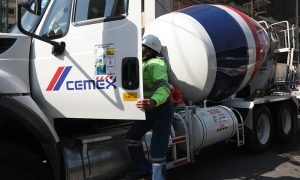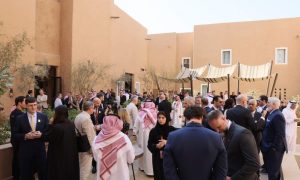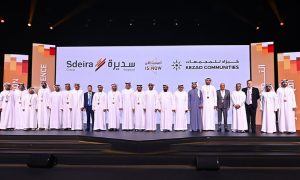Expo 2020 Dubai Exclusive: The company behind Al Wasl Plaza’s dazzling steelwork
Giuseppe Chiaranda, director of Rimond Group, sits down for an exclusive chat to discuss the impact of Expo 2020 Dubai and his wider ambitions for the region

In 2016, it was announced that two of the leading names in Italy’s construction industry were coming together in the UAE to bring a raft of architectural, manufacturing, engineering, project management and building solutions to the region.
Three years on from that announcement, the Cimolai Rimond Middle East joint venture has gone from strength to strength, offering complete turnkey construction solutions based on the latest advancements in building information modelling (BIM) technology. Not only has the company been an enthusiastic advocate for using technology within the regional industry, it has also highlighted what can be achieved through its adoption and use with its expanding portfolio of high-profile projects.
Among the most prestigious and important of these projects are the Expo 2020 Dubai pavilions and structures that the company is building. In December 2017, Cimolai Rimond was awarded the contact to provide steelwork for the intricate domed trellis of the Al Wasl Plaza. Once finished, the structure will weigh 2,265t and enclose a space of about 724,000m3, marking out the plaza as one of the must-visit attractions at the event.
In addition, the Italian-owned joint venture has been tasked with carrying out the enabling and foundation works for New Zealand’s $34.8m pavilion at Expo 2020 Dubai, which will be a spiral-shaped building architecturally inspired by the country’s Maori heritage.
Internationally, both partners have been associated with challenging and internationally known projects covering the full breath of market segments, including hospitality, healthcare, education, exhibition centres and country pavilions at previous expos. One of those projects was the acclaimed UAE Pavilion for Expo 2015 in Milan, which was then broken down and shipped to Masdar City, where it has now been reassembled and turned into a showpiece structure at the sustainable city.
As the contractor for that project back in Milan, and having overseen its disassembly, shipment and reassembly in Abu Dhabi, Rimond has been involved with the UAE for many years, having long operated an independent officer in the country prior to the joint venture.
Operating as a multi-faceted construction company with expertise that spans architectural design, general contracting, engineering and project/construction management, Rimond is the driving force behind the Cimolai Rimond joint venture. With its specialisation in leveraging technology in new and exciting ways, the company has delivered a high level of architectural, engineering and construction performance to its customers.
With Expo 2020 Dubai looming and the company ramping up operations in the region, Big Project ME sat down with Giuseppe Chiaranda, director of the Rimond Group, to discuss his plans for the company ahead of a crucial business cycle.
“We started operations in the UAE in 2016, taking the opportunity of this project in Abu Dhabi in Masdar, which was related to Expo 2015 in Milan. That was the relocation of the UAE Pavilion. From there, we immediately focused on Expo 2020, because of our experiences in Milan.
“We are now deeply involved in Expo 2020. We’ve taken on projects – one is Al Wasl Plaza, which will be the central part of Expo 2020 Dubai, and the New Zealand Pavilion. Apart from that, we’re also working in Meydan as a consultant of the main contractor on this huge project, which will be one of the largest malls in the world,” Chiaranda says.
“We are focusing more on special projects where we can add value with our experience of handling complex geometrics and models, in addition to fast-tracked projects. This is mostly our skillset. Whenever there are these kinds of opportunities, maybe with high-ranking architects or sophisticated clients, that’s where we want to place ourselves in the market.”
Having seen first-hand the impact of the Milan Expo on the city, Chiaranda predicts that next year’s mega event will have a similar effect on the UAE project development market. He points out that not only will Dubai see an immediate boost, but that neighbouring cities like Abu Dhabi should also benefit, especially when coupled with initiatives like Vision 2030.
“Having seen the beneficial aspects of an Expo, not only during the period of the event but past that as well, [I believe] it will give an opportunity to many people to visit Dubai for the first time, and allow them to understand the benefits and the positives of living in Dubai or having a house here.
“This should bring a boost to the market, in my opinion. Statistically, any world event will have an effect afterwards – an improvement. Before, during and after the event, I think Dubai will benefit the most from this, but even places like Abu Dhabi, I can see that with Vision 2030, some projects are coming under the spotlight. I think in one or two years, we’ll start seeing some feedback from these new market opportunities,” he asserts.
Furthermore, Chiaranda is keen to highlight that the Expo 2020 Dubai projects are going to be benchmarks for the industry, not only due to their high-profile nature, but also because of the technological excellence and skills that they demand, which in turn will stand the joint venture in good stead for future projects.
“Al Wasl Plaza, for example, is also quite a unique project. It has never been built before, which is like Dubai usually does. It will be one of the largest immersive experiences in the world, where the people inside can be astonished by large projects inside the dome. This is something that will make the project unique worldwide.”
In addition, he reveals that following the successful reassembly of the UAE Pavilion from Expo 2015 Milan, other countries have also expressed an interest in relocating or reusing all or part of their pavilions for Expo 2020 Dubai. However, he stresses that these projects have to be first designed with that intention in mind before any work can take place on the ground.
“We have been approached by some companies with this idea, but the design has to first reflect it. It needs to be dismantlable, transportable and reassembled wherever they want. I cannot disclose the countries that are wanting that, but many of them have this idea.”
While the upcoming Expo and its projects understandably take up a large amount of the company’s attention, Chiaranda says his focus is also on establishing Rimond as a major player within the GCC construction space. He believes the company’s well-known technological expertise will stand it in good stead as it chases new projects and clients for 2020 and beyond.
“Dubai is forecasting new, special projects [all the time] and trying to be unique. It is very focused on innovation. Being an innovative company in an innovative environment, that’s where it helps to be [as technically proficient as Cimolai Rimond]. The construction market is traditionally not very innovative, so bringing some innovation into construction is a target that I think Dubai has.
“I think we have quite a unique model that is deeply based in the digital world, in handling the design, the procurement and the scheduling and programming of the works. Not all the works can be adapted to this digital model, but when we have the opportunity to work on design and build projects, this is where these kinds of skills can be really helpful, especially if it’s a fast-track project.”
Looking ahead, Chiaranda envisions the company having a “permanent, inductive role in the UAE” where it won’t focus on a large number of projects, but rather on interesting ones that will provide a challenge to both the contractor and the client.
“In my opinion, there will be an opportunity in the Dubai Creek area, where innovative projects are already being designed and are ready to start. It is one of the largest areas of development in Dubai. Also there is the Al Maktoum Airport and all of the areas related to Dubai South. These will benefit from Expo 2020 Dubai.
“In Abu Dhabi, they have Vision 2030, where the government’s ambition is to redevelop and develop new areas, as well as improving logistics. Entertainment projects and museums are ongoing, with some projects already underway, but more culture and entertainment development can come. That’s something we’ll need to focus on.
“We also have some connection with Saudi Arabia. We are talking with clients there. Ultimately we need to find the right time to step into that market, because it’s a huge market. You need to decide very carefully where, when and which project you’ll be starting with,” he asserts.
Despite his ambitions, Chiaranda is quick to add a dose of reality, pointing out that Rimond also needs to be aware of how its competitors are behaving in a market with increasingly tight margins. While he accepts that the Italian firm may never be the cheapest, he insists that it provides greater efficiencies and optimisations on projects, making it an attractive option for clients.
“It is a competitive market, and in a competitive market, prices need to be competitive. Therefore, the margins and the profits can be very low. While I haven’t seen issues with payments or liquidity, particularly with working for Expo 2020 Dubai, for sure the market requires contractors to be very efficient. That’s the price of being competitive, and it’s the only way to survive in this market,” he concludes.




